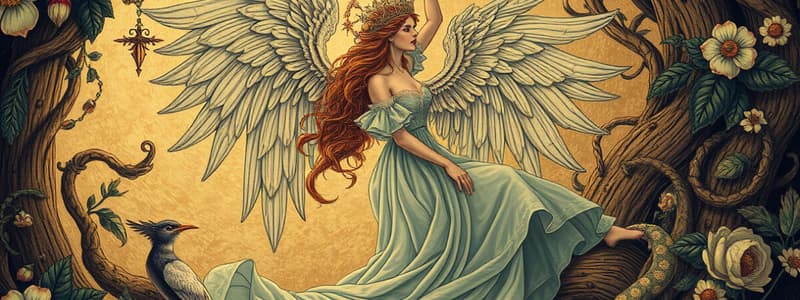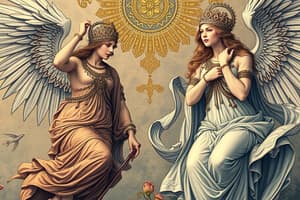Podcast
Questions and Answers
Which of the following best describes a myth?
Which of the following best describes a myth?
- A type of drama featuring tragic events
- A poem expressing deep feelings
- A factual historical account
- A traditional story explaining natural or social phenomena (correct)
Zeus is known as the ruler of the seas, rivers, and floods.
Zeus is known as the ruler of the seas, rivers, and floods.
False (B)
Who is considered the first actor?
Who is considered the first actor?
Thespis
Sophocles introduced the ______ actor.
Sophocles introduced the ______ actor.
Match the gods with their domains:
Match the gods with their domains:
What is Oedipus Rex also known as?
What is Oedipus Rex also known as?
Who wrote Oedipus Rex?
Who wrote Oedipus Rex?
What is the primary function of an ode in literature?
What is the primary function of an ode in literature?
Which god is associated with wine, agriculture, and fertility?
Which god is associated with wine, agriculture, and fertility?
Who is known for introducing the second actor in Greek drama?
Who is known for introducing the second actor in Greek drama?
What role does Hades play in mythology?
What role does Hades play in mythology?
What does the term 'tragedy' specifically refer to in the context of drama?
What does the term 'tragedy' specifically refer to in the context of drama?
Which of the following gods is associated with knowledge and the arts?
Which of the following gods is associated with knowledge and the arts?
Who added the third actor to Greek drama?
Who added the third actor to Greek drama?
Flashcards are hidden until you start studying
Study Notes
Key Terms and Definitions
- Myth: A traditional story that explains the early history of a people or natural/social phenomena, often involving supernatural beings or events.
- Ode: A lyrical poem written in an elevated style to express deep emotions, typically intended to be performed or sung.
- Tragedy: Originally referred to as "goat song," it represents a serious drama that typically ends in disaster.
Important Greek Gods
- Zeus: The king of the gods, ruler of Mount Olympus, associated with the sky and thunder.
- Dionysus: God of wine, agriculture, and fertility, celebrating the vine's life cycle and festivity.
- Hades: The ruler of the Underworld, overseeing the realm of the dead.
- Poseidon: The god of the sea, rivers, and floods, often depicted with a trident.
- Aphrodite: The goddess of beauty, desire, and love, embodying attraction and affection.
- Apollo: God of music, knowledge, the arts, healing, and prophecy, representing order and harmony.
Key Figures in Greek Drama
- Thespis: Recognized as the first actor, known for innovating solo performance in Greek theater.
- Aeschylus: A prominent playwright who introduced the second actor, expanding the narrative complexity of plays.
- Sophocles: A playwright who further advanced drama by adding a third actor, known for writing "Oedipus Rex."
- "Oedipus Rex": Also referred to as "Oedipus The King," this tragedy explores themes of fate, free will, and tragic irony.
Key Terms and Definitions
- Myth: A traditional story that explains the early history of a people or natural/social phenomena, often involving supernatural beings or events.
- Ode: A lyrical poem written in an elevated style to express deep emotions, typically intended to be performed or sung.
- Tragedy: Originally referred to as "goat song," it represents a serious drama that typically ends in disaster.
Important Greek Gods
- Zeus: The king of the gods, ruler of Mount Olympus, associated with the sky and thunder.
- Dionysus: God of wine, agriculture, and fertility, celebrating the vine's life cycle and festivity.
- Hades: The ruler of the Underworld, overseeing the realm of the dead.
- Poseidon: The god of the sea, rivers, and floods, often depicted with a trident.
- Aphrodite: The goddess of beauty, desire, and love, embodying attraction and affection.
- Apollo: God of music, knowledge, the arts, healing, and prophecy, representing order and harmony.
Key Figures in Greek Drama
- Thespis: Recognized as the first actor, known for innovating solo performance in Greek theater.
- Aeschylus: A prominent playwright who introduced the second actor, expanding the narrative complexity of plays.
- Sophocles: A playwright who further advanced drama by adding a third actor, known for writing "Oedipus Rex."
- "Oedipus Rex": Also referred to as "Oedipus The King," this tragedy explores themes of fate, free will, and tragic irony.
Studying That Suits You
Use AI to generate personalized quizzes and flashcards to suit your learning preferences.




